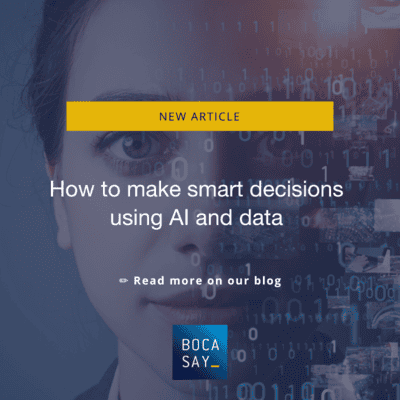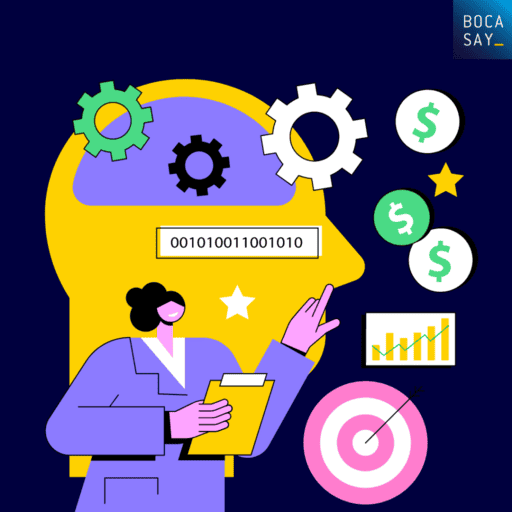How to make smart decisions using AI and data
Globally, a wide range of companies are taking a “data-driven” approach to operational decision-making. While data can improve decision-making, the right data processors are necessary in order to make the most of it. Many would consider human beings as the best data processors.
In order to unlock the full value contained in their data, companies must integrate artificial intelligence (AI) into their workflows and eventually eliminate humans. We need to move from data-driven workflows to AI-driven workflows.
In this article, our offshore outsourcing company Bocasay, provides the basic principles of using AI and data within your company’s operational decision-making.

Types of AI-based decision-making
There are three different types of AI-based decision making:
- Optimization.
- Autonomous decision-making.
- Human assistance.
1- Optimization
Optimization decisions are those where the AI finds the best option given a set of objectives and constraints. A common example of an optimization problem is finding the shortest path between two points on a map. Think Google Maps or Waze.
But it doesn’t stop there. For example, airlines can use AI to optimize flight schedules in order to minimize delays and maximize profits.
2- Autonomy
These decisions are made by AI without human intervention. While this may sound like a science fiction movie, in reality, there are many everyday examples of autonomous decision-making conducted by AI systems. Examples include using Amazon’s Alexa or Google Home to play music, set a timer…
3- Virtual Assistance
AI can power virtual assistance systems that can make useful recommendations to humans, who ultimately make the final decisions. For example, in healthcare, doctors can use AI systems to help diagnose diseases and recommend treatments. However, the final decision rests with them.
👉 Using AI and data in business decision-making
Leaders must learn to use artificial intelligence (AI) in order to improve their decision-making skills if they want to stay competitive in today’s economy.
If you are a key decision-maker, you already know that your decisions are critical to your business success. Therefore, it is always important to make decisions based on the right data and at the right time.
For example, when choosing which new products to introduce to the market, you will often have to analyze complex spreadsheets and reports. You may even need to seek advice from category managers, suppliers and more experienced people. You’ll probably also need to work with a data analyst to create some reports. Ultimately, you end up spending too much time, effort and probably resources.
With an AI-based smart analytics system like Alexa or Siri, you could easily ask questions by using your smartphone, tablet or PC.
Key questions such as “Which product is the lowest selling and why?” can be instantly answered by the system, as it combs through all relevant data regarding the product you are interested in:
- How many product units were sold?
- How many were returned?
- What is the general opinion of previous users/buyers?
- Are there similar products available from competitors?
- And much more.
Ultimately, all this useful information that can essentially speed-up decision-making like never before, arrives to your chosen digital device from multiple software platforms. These include points of sale, e-commerce websites and applications, customer relationship management and inventory databases.
ℍ𝕒𝕧𝕖 𝕪𝕠𝕦 𝕔𝕠𝕟𝕤𝕚𝕕𝕖𝕣𝕖𝕕 𝕠𝕦𝕥𝕤𝕠𝕦𝕣𝕔𝕚𝕟𝕘 𝕪𝕠𝕦𝕣 𝕀𝕋 𝕕𝕖𝕧𝕖𝕝𝕠𝕡𝕞𝕖𝕟𝕥 𝕡𝕣𝕠𝕛𝕖𝕔𝕥𝕤? 𝕋𝕙𝕖 𝔹𝕠𝕔𝕒𝕤𝕒𝕪 𝕠𝕗𝕗𝕤𝕙𝕠𝕣𝕖 𝕠𝕦𝕥𝕤𝕠𝕦𝕣𝕔𝕚𝕟𝕘 𝕔𝕠𝕞𝕡𝕒𝕟𝕪 𝕒𝕟𝕕 𝕚𝕥𝕤 𝕖𝕩𝕡𝕖𝕣𝕥𝕤 𝕒𝕣𝕖 𝕒𝕥 𝕪𝕠𝕦𝕣 𝕤𝕖𝕣𝕧𝕚𝕔𝕖 𝕥𝕠 𝕙𝕖𝕝𝕡 𝕪𝕠𝕦 𝕠𝕡𝕥𝕚𝕞𝕚𝕫𝕖 𝕪𝕠𝕦𝕣 𝕠𝕟𝕝𝕚𝕟𝕖 𝕓𝕦𝕤𝕚𝕟𝕖𝕤𝕤 𝕒𝕟𝕕 𝕕𝕖𝕧𝕖𝕝𝕠𝕡 𝕪𝕠𝕦𝕣 𝕓𝕦𝕤𝕚𝕟𝕖𝕤𝕤 𝕥𝕠𝕠𝕝𝕤! 𝔸𝕤𝕜 𝕗𝕠𝕣 𝕪𝕠𝕦𝕣 𝕗𝕣𝕖𝕖 𝕢𝕦𝕠𝕥𝕖 𝕟𝕠𝕨!
The future of AI and data-driven decision-making 🚀
Next-generation data-driven AI is a game changer for consumer-centric businesses. We’ll continue with some examples that illustrate how data-driven intelligence powered by AI can create a myriad of growth opportunities for many types of businesses.
Supermarkets 🛒
Data-driven AI tools can help you understand customer behavior with personalized shopping analytics based on time and location. This is especially important in an industry where the ability to anticipate product requirements and customer behavior can mean the difference between struggle and success.
Restaurants 🍽️
Analyze customer traffic in real time, plan ahead and predict the right quantities. Optimize your menu and minimize waste by knowing exactly which customer ordered what and when.
E-commerce 🌐
View sales analytics to understand which items are often purchased together, create dynamic packages, and use smart pricing to increase customer sensitivity to product price changes.
Hospitality 🏩
Easily discover why customer demand for rooms and services fluctuates dramatically. Analyze and predict the best price in order to maximize efficiency and profitability.

⚖️ Legislation around Artificial Intelligence ⚖️
AI enables better and more efficient data-driven decision making. However, risks can also lurk. AI-based decisions must be legal, transparent, and subject to human oversight and review. Legal reform is still needed in order to make these types of decisions more accountable and in order to protect people from any potential harm after these decisions are taken.
In order to fully unlock the value contained in their data, companies must integrate artificial intelligence (AI) into their workflows, and to sometimes replace humans.
It’s not just about automation. By leaving the processing of large amounts of data to machines, we limit errors related to transcription, but also to judgments. Reducing human intervention also increases the security of data protection.
Data contains information that enables us to make better decisions. Processing is the means by which this information is extracted and action can be taken. Humans and AI are both data processors with very different capabilities.
Efficiently combining human intelligence with data-driven AI ultimately maximizes the potential of your business.